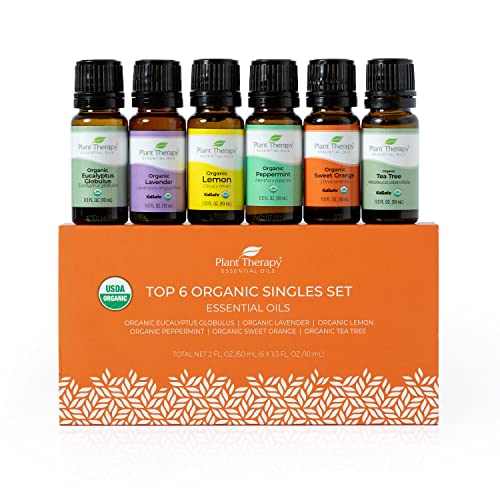


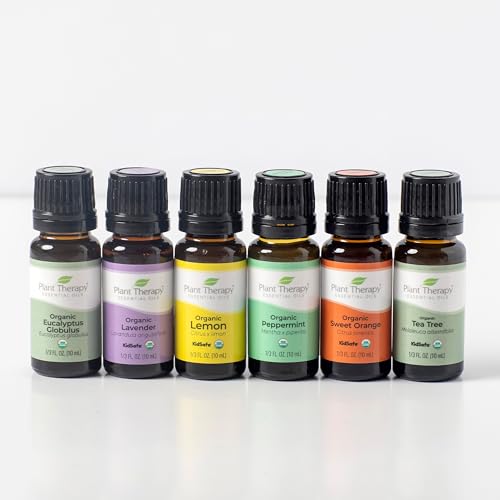
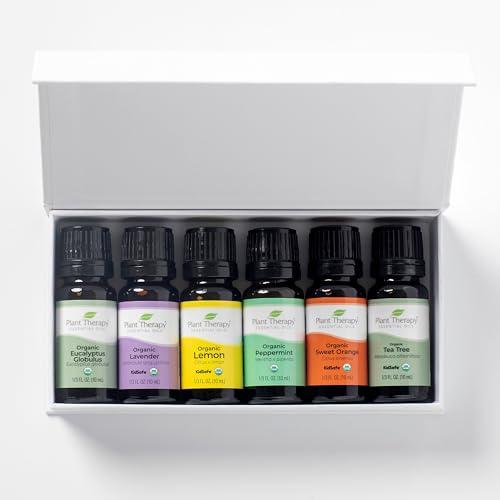
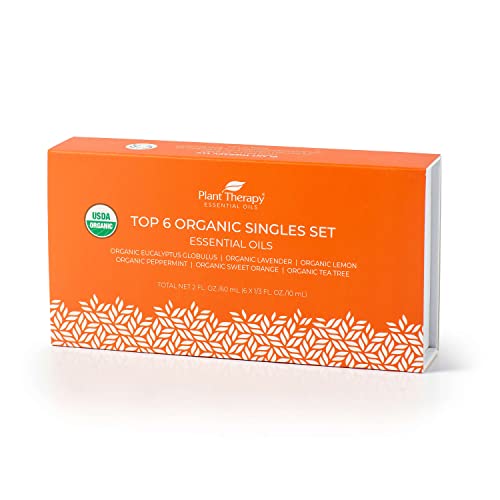

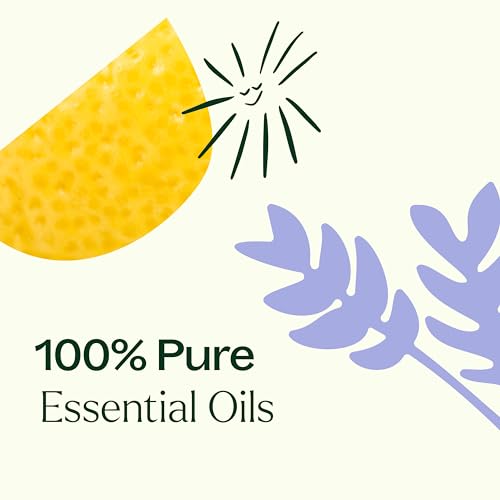
Plant Therapy Top 6 Organic Essential Oils Set - Therapeutic Blends for Wellness - 10 mL Each


Gaultheria Procumbens (Wintergreen) Leaf Extract
Low RiskGaultheria procumbens (wintergreen) leaf extract is derived from the leaves of the wintergreen plant. This extract is commonly used in personal care products for its potential soothing properties and characteristic fragrance. It is often included in formulations for its aromatic qualities and may contribute to product stability.
Sustai Insights
Gaultheria procumbens leaf extract is recognized for its functional benefits, including soothing properties and pleasant scent. It is sustainably sourced and shows low health risk concerns, with negligible potential for carcinogenicity, allergies, or reproductive toxicity. Regulatory assessments indicate it is not currently restricted. Environmental impact appears minimal, with no significant pollution or bioaccumulation concerns. Overall, this ingredient is considered low risk, making it a suitable choice in formulations. For those seeking alternatives, other botanical extracts may provide similar benefits.
Lavandula (Lavender) Flower
Low RiskLavandula (lavender) flower refers to unspecified preparations of the lavender plant, known for its aromatic properties. It is commonly used in various products for fragrance and potential therapeutic benefits, such as calming effects. The ingredient has a low risk profile regarding common health concerns.
Sustai Insights
Lavender flower offers functional benefits primarily as a fragrance and potential calming agent in products. It is considered sustainably sourced with low environmental impact and is not associated with significant health risks, such as carcinogenicity, allergies, or reproductive toxicity. Regulatory bodies, including the FDA, do not impose restrictions on its use. However, as with any ingredient, proper usage is recommended to mitigate any minor irritation risks. Overall, it presents a low-risk profile, making it a favorable choice in formulations.
Melaleuca Alternifolia (Tea Tree)
Low RiskMelaleuca alternifolia, commonly known as tea tree, is an unspecified preparation derived from the leaves of the tea tree. It is primarily used for its antiseptic properties and is found in various personal care products.
Sustai Insights
Tea tree oil offers functional benefits such as antimicrobial properties, making it effective in skincare formulations. It is considered to have low health risks, including low concerns for carcinogenicity, allergies, and reproductive toxicity. Environmental risks are minimal, with no significant pollutant or bioaccumulation potential. Regulatory bodies have noted no major advisories, and overall risk assessment remains low. For safe usage, it is recommended to use appropriate concentrations and consider alternatives like lavender or eucalyptus oil for similar benefits.
Citrus Limon (Lemon)
Low RiskCitrus limon, commonly known as lemon, is a citrus fruit used primarily for its juice and zest. It is often included in personal care products for its astringent properties and as a natural fragrance. It is recognized for its potential antioxidant benefits and as a source of vitamin C.
Sustai Insights
Citrus limon offers functional benefits like acting as a natural preservative and providing fragrance in formulations. It is sustainably sourced and biodegradable. Health risks are considered low for carcinogenicity, allergies, and reproductive toxicity. Environmental risks are minimal, with no significant bioaccumulation. Regulatory status is favorable, with no current restrictions noted. Overall, this ingredient poses a low risk, making it a safe choice for consumers.
Eucalyptus Globulus
Low RiskEucalyptus globulus, commonly known as eucalyptus, is a species of tree native to Australia. It is primarily used for its essential oil, which is known for its aromatic properties and potential applications in various products, including cosmetics and household cleaners.
Sustai Insights
Eucalyptus globulus offers functional benefits such as antimicrobial properties and acts as a natural fragrance in products. It is sustainably sourced and generally considered biodegradable. Health risks are minimal, with low concerns for carcinogenicity, allergies, and reproductive toxicity; however, it can cause skin and respiratory irritation. Environmental risks are low, with no significant pollutant or bioaccumulation concerns reported. Regulatory agencies have not issued any restrictions. Overall, the ingredient is assessed as low risk, with safe usage practices recommended and alternatives available for those sensitive to essential oils.
Citrus Sinensis (Sweet Orange)
Low RiskCitrus sinensis, commonly known as sweet orange, is a citrus fruit widely used in various products for its aromatic properties and as a flavoring agent. It is also employed for its oil, which acts as a natural fragrance and has potential antimicrobial properties.
Sustai Insights
Sweet orange offers functional benefits as a natural fragrance and may provide antimicrobial properties. It is generally considered low risk for health concerns, including carcinogenicity, allergies, and reproductive toxicity. Environmental impacts are minimal, with no significant pollutant potential or bioaccumulation. Regulatory status is favorable, with no current restrictions. Safe usage practices are recommended, and alternatives such as other citrus oils can be considered. Overall, the ingredient is assessed as low risk.
Gaultheria Procumbens (Wintergreen) Leaf Extract
Low RiskGaultheria procumbens (wintergreen) leaf extract is derived from the leaves of the wintergreen plant. This extract is commonly used in personal care products for its potential soothing properties and characteristic fragrance. It is often included in formulations for its aromatic qualities and may contribute to product stability.
Sustai Insights
Gaultheria procumbens leaf extract is recognized for its functional benefits, including soothing properties and pleasant scent. It is sustainably sourced and shows low health risk concerns, with negligible potential for carcinogenicity, allergies, or reproductive toxicity. Regulatory assessments indicate it is not currently restricted. Environmental impact appears minimal, with no significant pollution or bioaccumulation concerns. Overall, this ingredient is considered low risk, making it a suitable choice in formulations. For those seeking alternatives, other botanical extracts may provide similar benefits.
Lavandula (Lavender) Flower
Low RiskLavandula (lavender) flower refers to unspecified preparations of the lavender plant, known for its aromatic properties. It is commonly used in various products for fragrance and potential therapeutic benefits, such as calming effects. The ingredient has a low risk profile regarding common health concerns.
Sustai Insights
Lavender flower offers functional benefits primarily as a fragrance and potential calming agent in products. It is considered sustainably sourced with low environmental impact and is not associated with significant health risks, such as carcinogenicity, allergies, or reproductive toxicity. Regulatory bodies, including the FDA, do not impose restrictions on its use. However, as with any ingredient, proper usage is recommended to mitigate any minor irritation risks. Overall, it presents a low-risk profile, making it a favorable choice in formulations.
Melaleuca Alternifolia (Tea Tree)
Low RiskMelaleuca alternifolia, commonly known as tea tree, is an unspecified preparation derived from the leaves of the tea tree. It is primarily used for its antiseptic properties and is found in various personal care products.
Sustai Insights
Tea tree oil offers functional benefits such as antimicrobial properties, making it effective in skincare formulations. It is considered to have low health risks, including low concerns for carcinogenicity, allergies, and reproductive toxicity. Environmental risks are minimal, with no significant pollutant or bioaccumulation potential. Regulatory bodies have noted no major advisories, and overall risk assessment remains low. For safe usage, it is recommended to use appropriate concentrations and consider alternatives like lavender or eucalyptus oil for similar benefits.
Citrus Limon (Lemon)
Low RiskCitrus limon, commonly known as lemon, is a citrus fruit used primarily for its juice and zest. It is often included in personal care products for its astringent properties and as a natural fragrance. It is recognized for its potential antioxidant benefits and as a source of vitamin C.
Sustai Insights
Citrus limon offers functional benefits like acting as a natural preservative and providing fragrance in formulations. It is sustainably sourced and biodegradable. Health risks are considered low for carcinogenicity, allergies, and reproductive toxicity. Environmental risks are minimal, with no significant bioaccumulation. Regulatory status is favorable, with no current restrictions noted. Overall, this ingredient poses a low risk, making it a safe choice for consumers.
Eucalyptus Globulus
Low RiskEucalyptus globulus, commonly known as eucalyptus, is a species of tree native to Australia. It is primarily used for its essential oil, which is known for its aromatic properties and potential applications in various products, including cosmetics and household cleaners.
Sustai Insights
Eucalyptus globulus offers functional benefits such as antimicrobial properties and acts as a natural fragrance in products. It is sustainably sourced and generally considered biodegradable. Health risks are minimal, with low concerns for carcinogenicity, allergies, and reproductive toxicity; however, it can cause skin and respiratory irritation. Environmental risks are low, with no significant pollutant or bioaccumulation concerns reported. Regulatory agencies have not issued any restrictions. Overall, the ingredient is assessed as low risk, with safe usage practices recommended and alternatives available for those sensitive to essential oils.
Citrus Sinensis (Sweet Orange)
Low RiskCitrus sinensis, commonly known as sweet orange, is a citrus fruit widely used in various products for its aromatic properties and as a flavoring agent. It is also employed for its oil, which acts as a natural fragrance and has potential antimicrobial properties.
Sustai Insights
Sweet orange offers functional benefits as a natural fragrance and may provide antimicrobial properties. It is generally considered low risk for health concerns, including carcinogenicity, allergies, and reproductive toxicity. Environmental impacts are minimal, with no significant pollutant potential or bioaccumulation. Regulatory status is favorable, with no current restrictions. Safe usage practices are recommended, and alternatives such as other citrus oils can be considered. Overall, the ingredient is assessed as low risk.
BEST SELLING ORGANIC ESSENTIAL OILS SET: Discover the ultimate organic essential oil collection with Plant Therapy’s Top 6 Organic Set. Perfect for personal use or as a thoughtful gift, this set features 10 mL bottles of Eucalyptus Globulus, Lavender, Lemon, Peppermint, Sweet Orange, and Tea Tree, ensuring satisfaction with every drop.
- Versatile Applications: Enhance circulation with Eucalyptus and create tranquility with Lavender.
- Immune Support: Lemon essential oil is included to help boost your immune system.
- Energizing Aroma: Peppermint promotes alertness and revitalizes your senses.
- Mood Booster: Sweet Orange uplifts spirits and alleviates sadness.
- Skin Clarity: Tea Tree oil effectively addresses problem skin areas.
- USDA Certified Organic: Oils are sourced from non-GMO plants, promoting biodiversity.
- Quality Assurance: Each oil undergoes rigorous testing for purity and potency.
Subscribe & Save with Sustai
- Best Price Guarantee: Always enjoy the lowest prices on sustainable home essentials.
- No Surprises: We’ll notify you before shipping. No hidden fees, ever.
- You’re in Charge: Change, pause, or cancel your subscription anytime with ease.
- Eco-Friendly Deliveries: Our grouped shipments mean less packaging and lower emissions.
Join us on a sustainable journey. Special offers for a limited time! Prices and promotions may change.
Recommended Products
BEST SELLING ORGANIC ESSENTIAL OILS SET: Discover the ultimate organic essential oil collection with Plant Therapy’s Top 6 Organic Set. Perfect for personal use or as a thoughtful gift, this set features 10 mL bottles of Eucalyptus Globulus, Lavender, Lemon, Peppermint, Sweet Orange, and Tea Tree, ensuring satisfaction with every drop.
- Versatile Applications: Enhance circulation with Eucalyptus and create tranquility with Lavender.
- Immune Support: Lemon essential oil is included to help boost your immune system.
- Energizing Aroma: Peppermint promotes alertness and revitalizes your senses.
- Mood Booster: Sweet Orange uplifts spirits and alleviates sadness.
- Skin Clarity: Tea Tree oil effectively addresses problem skin areas.
- USDA Certified Organic: Oils are sourced from non-GMO plants, promoting biodiversity.
- Quality Assurance: Each oil undergoes rigorous testing for purity and potency.

You can have at most 2 Sustainable Steals products in your cart
Customer Reviews
Customers’ View
Customers express a strong appreciation for the Essential Oil Set, highlighting its organic composition and versatility for various uses. Many users find the scents, particularly Lavender and Eucalyptus, to be delightful and effective for relaxation and mental clarity. One customer noted, 'I love it; it smells so good,' reflecting the positive sentiments towards the product's aromatic qualities. The oils are often utilized in personal care routines, cleaning solutions, and even as gifts, emphasizing their natural and eco-friendly attributes. Additionally, customers value the USDA Organic certification, ensuring the oils are sourced from non-GMO plants, which aligns with their health-conscious lifestyles. Overall, this essential oil set is well-received for its quality and alignment with sustainable practices.
AI-generated from the text of customer reviewsThis product is rated 4.7 of 5.0 stars.
It has received 10 reviews.





